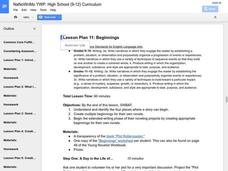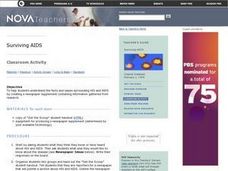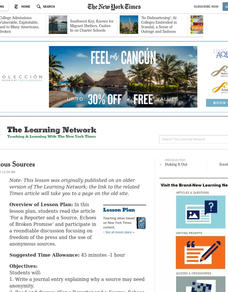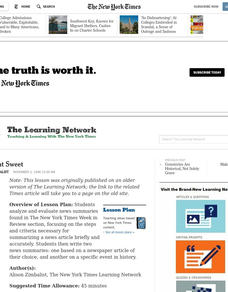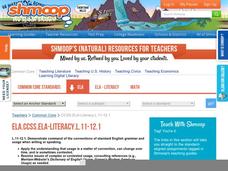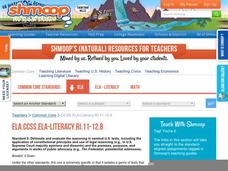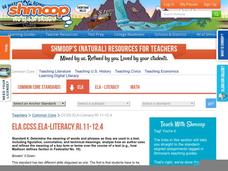Curated OER
Lesson Plan 11: Beginnings
Every good novel needs a solid beginning! Setting the stage can have your budding authors stumped, so use this lesson to get them thinking. After examining the plot rollercoaster image (included) they consider the four places...
Curated OER
Persuasion as Text: Organizational, Grammatical, and Lexical Moves in Barbara Jordan’s "All Together Now"
A thorough lesson plan on persuasive writing takes middle schoolers through several activities, including group discussion, collaborative posters, and independent writing. They compare historical speeches and analyze the persuasive...
Curated OER
Surviving AIDS
Enhance your middle and high schoolers' research skills with this lesson. After viewing a video clip about HIV and AIDS, high schoolers identify the facts and issues surrounding the disease. They work together to create a newspaper...
Curated OER
"Take my Advice": Poems with a Voice
Discuss the meaning of the phrase tone of voice with the class. They respond to a variety of scenarios where a particular tone would be prevalent. They then read "Mother to Son" without knowing the title and answer some questions about...
Curated OER
The Bill of Rights
In groups, learners review one of four selected Supreme Court cases. The whole class watches a video introducing the four cases, and then small groups dive into Internet research in an attempt to write a two-paragraph summary of the...
Curated OER
Say Hi to Haibun Fun
What is a haibun? With this interesting lesson, writers will experience the Japanese writing form haibun, identify elements important to Japanese writing styles, analyze a haibun, and compose their own. Different from the typical journal...
Curated OER
Children's Books
A challenging lesson on writing a book for children awaits your fifth-graders. They must use laptops, document cameras, and a projector to create and present an original piece of writing. A checklist that has all of the requirements for...
Curated OER
Can Scientists Discover a Limit to Discovery?
Is there anything left to discover? Evaluate opposing sides of the debate regarding whether or not there is a future for scientific discovery. Middle and high schoolers assess quotations from the articles included to evaluate claims and...
Curated OER
Anonymous Sources in the Media
When do people ask for anonymity? Why? After reading the New York Times article "For a Reporter and a Source, Echoes of Broken Promise," young readers participate in a roundtable discussion focusing on freedom of the press and the use of...
Curated OER
Short But Sweet
After analyzing and evaluating news summaries found in the New York Times "Week in Review" section, middle schoolers study the steps for summarizing a news article briefly and accurately. They write two news summaries: one on a newspaper...
Core Knowledge Foundation
Third Grade Skills Unit 4: Stories of Ancient Rome
A unit covering stories of Ancient Rome examines spelling rules, suffixes, verbs, quotation marks, writing, and dictionary skills. Lessons follow a similar routine; reading, skills practice, and extension activities, followed by...
Curated OER
Arti-Factual Evidence
Practice responding to controversial information with the New York Times lesson plan provided here. Middle schoolers watch a video interview with the director of The Lost Tomb of Jesus. After reading a companion article, they...
Curated OER
Whose Rite Is It?
The class explores and debates, from multiple perspectives, a petition to allow Hopi Indians to take golden eagle hatchlings from a federal wildlife sanctuary for use in a religious ceremony. Pupils defend their personal views on the...
Shmoop
ELA.CCSS.ELA-Literacy.RI.11-12.7
Comparing information found in images, charts, and graphs with that found in written text can be a challenge for even senior high scholars. Provide learners with an opportunity to practice this skill with an exercise that asks them to...
Shmoop
ELA.CCSS.ELA-Literacy.L.11-12.1
Despite English grammar rules, in the e-world the plural of mouse is mouses. lol. Standard American English is constantly evolving. Introduce your class members to a variety of terms that describe different usage changes (economy,...
Shmoop
ELA - Literacy.CCSS.ELA-Literacy.RH.9-10.1
Do your pupils know what a primary source is? How about a secondary source? Provide them with the information here about different types of documents and then test their knowledge with a brief quiz. The quiz is made up of two documents....
Shmoop
ELA.CCSS.ELA-Literacy.RI.11-12.3
Make analyzing the sequence of events in an informational text easy. Ask readers to craft a one-sentence summary of each paragraph in a document and create a text map. To demonstrate their understanding of the process, participants read...
Shmoop
ELA.CCSS.ELA-Literacy.SL.9-10.3
Don't let your pupils take everything at face value! They should analyze and evaluate what speakers say. Practice this skill with the two related activities described here. After brainstorming critical questions, learners can listen to...
Shmoop
ELA.CCSS.ELA-Literacy.L.11-12.5
"Timid, scared, terrified." High school scholars examine words, their denotations and connotations, in a series of exercises that use lines from Shakespeare to explore figurative language and word relationships. Participants then...
Shmoop
ELA.CCSS.ELA-Literacy.RI.11-12.8
It is no easy feat to wade through legal and political documents. And incorporating this type of informational text into a literature class can also be a challenge. Here’s a resource that includes suggestions for how to address this...
Shmoop
ELA.CCSS.ELA-Literacy.RI.9-10.8
Your learners need to develop skills to argue effectively, and this comes by understanding the traditions that make claims valid, and what detracts from their effectiveness. Although this resource does not give advice on how to...
Shmoop
ELA.CCSS.ELA-Literacy.W.11-12.7
Your pupils are beginning their research project and are having a hard time narrowing their topics down. If you’re not sure how to help them, then start here. Provided is a student dialogue that works though the issues of narrowing a...
Shmoop
ELA.CCSS.ELA-Literacy.RL.11-12.5
What would happen if I structured this review by beginning in the middle of it? Or by flashing back to the dinner I had last night that gave me bad heartburn, and then transitioned into how the lingering burn of acid seeped into my...
Shmoop
ELA.CCSS.ELA-Literacy.RI.11-12.4
Determining the meaning of a word based on context clues or marking how the meaning of a term evolves in the course of a document can be a challenge in more complex text. Give your pupils an opportunity to practice this skill with a...
